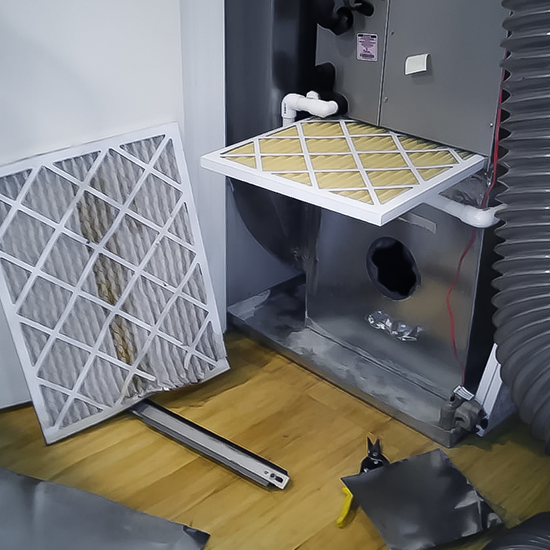Exploring Geothermal Heating, Ventilation, and Air Conditioning Technologies: Are They Beneficial It?

With an increasing number of homeowners gradually seek additional sustainable and cost-effective solutions for their heating and cooling needs, geothermal HVAC systems have emerged as a strong option. Such advanced systems utilize the earth's natural energy to provide simultaneous heating and cooling, offering a unique alternative to conventional HVAC setups. But are they justifiable the investment?
In this guide, we will explore the fundamentals of geothermal HVAC systems, analyzing how they operate and contrasting their benefits and drawbacks. We will also discuss key considerations for homeowners contemplating this technology, as well as practical tips for maximizing energy efficiency and indoor comfort. If you are new to HVAC concepts or seeking upgrade your current setup, this guide will provide insightful insights into the benefits of geothermal energy in your home.
Comprehending HVAC Basics
Heating, Ventilation, and Air Conditioning refers to heating, providing ventilation, and cooling systems, a system created to provide comfortable temperatures and satisfactory quality of air indoors in residential and commercial establishments. Understanding HVAC is essential for homeowners and building managers alike, since it consists of multiple parts that work in unison to regulate the climate within a space. The heating aspect typically includes furnaces or heat pumps, while cooling is provided by air conditioning systems. The ventilation process is key for ensuring that fresh air circulates, which can also help in managing humidity levels and improving indoor air quality.
Each part of an HVAC system has a specific role in keeping a comfortable environment. The heating mechanisms, whether gas, electricity, or geothermal energy, warm the space during colder months. Air conditioning units cool the area in the summer months, often utilizing refrigerants to absorb heat indoors. Proper ventilation setups are essential for eliminating contaminants and ensuring a consistent flow of air, which contributes to a more beneficial home. Understanding how these components interact can assist homeowners diagnose issues and value their importance.
To fully utilize HVAC systems, understanding of their functionality and upkeep is required. Regular upkeep activities, like changing air filters and arranging professional inspections, can prevent frequent issues and prolong the system's duration. Property owners should also be conscious of energy-saving standards and the possible benefits of upgrading to intelligent systems, which can lead to significant savings on energy bills. Familiarity of HVAC fundamentals not only improves comfort but also encourages a forward-thinking approach to home management.
HVAC Maintenance Essentials
Regular maintenance is essential for maintaining your HVAC system running optimally and extending its lifespan. A properly cared for system not only provides maximum heating and cooling but also minimizes the risk of unexpected breakdowns. Begin with regular inspections to identify signs of wear and tear. Replace or clean air filters every 1-3 months, depending on usage and filter type. Fresh filters boost airflow and indoor air quality, which can help in reducing allergies and health issues.
In addition to regular filter maintenance, ensure that the outdoor unit is uncluttered of debris and vegetation. This allows for proper airflow and avoids overheating. Arranging seasonal tune-ups with a certified technician can also spot potential problems that might lead to significant repair costs down the line. During these inspections, technicians typically check refrigerant levels, clean evaporator and condenser coils, and ensure that all wiring components are operating as intended.
Lastly, be sure to track your system's performance throughout the season. Keep an eye on unusual noises or variations in efficiency, and resolve any issues promptly. This forward-thinking approach ensures not only the longevity of your HVAC system but also helps maintain a comfortable indoor environment while potentially lowering your energy bills.
Examining Earth-based Alternatives
Geothermal HVAC systems exploit the stable heat found beneath the Earth's surface to facilitate optimized heating and chilling for residences and commercial buildings. By utilizing a network of underground pipes, these systems transfer heat with the earth, substantially lowering the energy necessary for interior climate control. This renewable energy source not only promotes green practices but also delivers sustained cost savings on energy bills, rendering it an alluring option for eco conscious consumers.
One of the primary advantages of geothermal systems is their performance. Compared to traditional heating and chilling systems, geothermal systems can be as much as four times more effective, as they transfer heat rather than create it. This effectiveness translates to reduced utility costs and a minimized carbon footprint, which is attractive in an era of growing energy prices and growing awareness of climate change. Additionally, find out here require less maintenance than traditional HVAC units, leading to their long-term reliability and performance.
Nonetheless, the initial investment for geo-thermal HVAC systems can be considerable, due to the costs connected with installation and the necessary ground loops. Homeowners must balance the initial expense against prospective energy savings and government incentives for sustainable energy systems. Over time, the ROI can make geothermal systems worthwhile, particularly for those hoping to stay in their residences for many years. As technology improves and costs slowly decline, geothermal HVAC options will probably become even more feasible for a wider audience.

